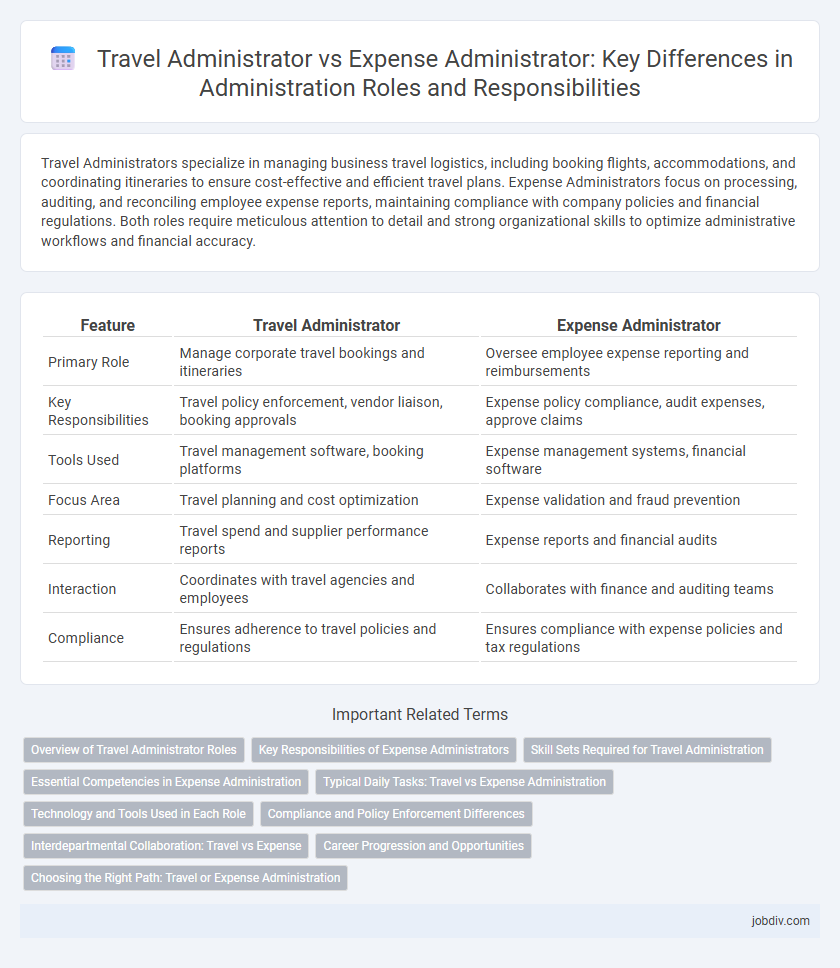Travel Administrators specialize in managing business travel logistics, including booking flights, accommodations, and coordinating itineraries to ensure cost-effective and efficient travel plans. Expense Administrators focus on processing, auditing, and reconciling employee expense reports, maintaining compliance with company policies and financial regulations. Both roles require meticulous attention to detail and strong organizational skills to optimize administrative workflows and financial accuracy.
Table of Comparison
| Feature | Travel Administrator | Expense Administrator |
|---|---|---|
| Primary Role | Manage corporate travel bookings and itineraries | Oversee employee expense reporting and reimbursements |
| Key Responsibilities | Travel policy enforcement, vendor liaison, booking approvals | Expense policy compliance, audit expenses, approve claims |
| Tools Used | Travel management software, booking platforms | Expense management systems, financial software |
| Focus Area | Travel planning and cost optimization | Expense validation and fraud prevention |
| Reporting | Travel spend and supplier performance reports | Expense reports and financial audits |
| Interaction | Coordinates with travel agencies and employees | Collaborates with finance and auditing teams |
| Compliance | Ensures adherence to travel policies and regulations | Ensures compliance with expense policies and tax regulations |
Overview of Travel Administrator Roles
Travel Administrators manage corporate travel logistics, including booking flights, accommodations, and transportation while ensuring compliance with company travel policies. They coordinate with vendors, monitor travel budgets, and process travel-related documentation such as itineraries and travel authorizations. Their role emphasizes optimizing travel efficiency, reducing costs, and enhancing employee travel experiences.
Key Responsibilities of Expense Administrators
Expense Administrators oversee the review, processing, and reconciliation of employee expense reports, ensuring compliance with corporate policies and regulatory requirements. They manage expense tracking systems, verify receipt documentation, and coordinate with finance teams to approve reimbursements accurately and timely. Their role includes identifying discrepancies, preventing fraud, and generating detailed financial reports for budget analysis and audit purposes.
Skill Sets Required for Travel Administration
Travel administrators require expertise in itinerary planning, vendor negotiations, and travel policy compliance to optimize corporate travel programs. Proficiency with travel management software, strategic budgeting, and risk management ensures seamless coordination and cost efficiency. Strong communication and problem-solving skills enable effective handling of unexpected changes and traveler support.
Essential Competencies in Expense Administration
Expense administrators require expertise in financial reporting, account reconciliation, and compliance with corporate expense policies to ensure accurate tracking and approval of expenditures. Proficiency in expense management software and an in-depth understanding of tax regulations related to reimbursements are critical for preventing errors and fraud. Strong analytical skills and attention to detail enable expense administrators to optimize budget allocation and support organizational financial health effectively.
Typical Daily Tasks: Travel vs Expense Administration
Travel administrators manage booking flights, accommodations, and transportation while ensuring compliance with company travel policies. Expense administrators review, verify, and process expense reports, ensuring accurate reimbursement and adherence to financial regulations. Both roles require coordination with employees and vendors but focus on distinct aspects of corporate travel and expense management.
Technology and Tools Used in Each Role
Travel Administrators primarily utilize specialized travel management software such as Concur and Egencia to coordinate bookings, itineraries, and compliance with corporate travel policies. Expense Administrators rely heavily on automated expense reporting tools like Expensify and SAP Concur Expense to streamline receipt processing, approvals, and reimbursement workflows. Both roles leverage integrated platforms that connect travel and expense data, enhancing accuracy and real-time financial visibility.
Compliance and Policy Enforcement Differences
Travel Administrators focus on managing travel bookings and approvals while ensuring adherence to company travel policies and government regulations. Expense Administrators oversee the processing and verification of expense reports, enforcing compliance with financial policies and preventing fraud. The key difference lies in Travel Administrators enforcing travel-specific policies, whereas Expense Administrators emphasize overall expense compliance and audit controls.
Interdepartmental Collaboration: Travel vs Expense
Travel Administrators coordinate with finance, human resources, and external vendors to ensure seamless booking, compliance with company travel policies, and accurate itinerary management. Expense Administrators work closely with accounting, procurement, and department managers to validate expense reports, enforce spending limits, and facilitate timely reimbursements. Both roles require effective interdepartmental collaboration to optimize budget control and streamline overall administrative workflows.
Career Progression and Opportunities
Travel Administrators often manage corporate travel logistics, developing expertise in vendor negotiations and travel policy compliance, which can lead to roles like Corporate Travel Manager or Procurement Specialist. Expense Administrators focus on processing and auditing financial claims, mastering expense reporting systems and regulatory adherence, positioning themselves for advancement to roles such as Finance Manager or Compliance Officer. Both paths offer career growth within administration, emphasizing distinct skill sets that align with travel coordination or financial oversight opportunities.
Choosing the Right Path: Travel or Expense Administration
Choosing between a Travel Administrator and an Expense Administrator depends on the organization's operational focus and budget management needs. Travel Administrators specialize in coordinating company travel logistics, negotiating with vendors, and ensuring compliance with travel policies, while Expense Administrators manage reimbursement processes, audit expense reports, and maintain accurate financial records. Aligning these roles with strategic goals enhances efficiency in travel planning or expense control, ultimately optimizing administrative workflows.
Travel Administrator vs Expense Administrator Infographic

 jobdiv.com
jobdiv.com